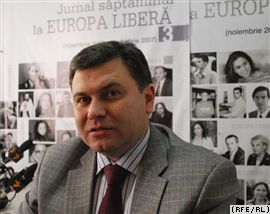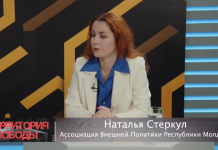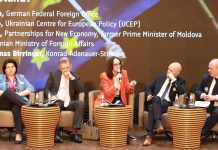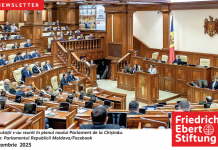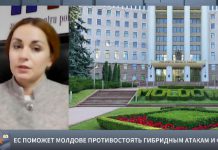During the first year of Alliance for European Integration government, Republic of Moldova’s foreign policy has been characterized by dynamism, initiative, intelligence and consistency. Moldovan diplomacy has able to capitalize effectively on the unified and strong political will expressed by the AEI in the area of European integration and to make the maximum out of the openness and confidence expressed by the EU and its Member States to the new democratic and pro-European government in Chișinău.
Consequently, Moldovan diplomacy succeeded in boosting the Moldovan-EU political dialogue and accelerating the process of qualitative transformation of the partnership with the EU. In the same context, we have normalized relations with Romania, and now we are witnessing the institutionalization of a strategic partnership focused on European integration.
In relations with the Russian Federation, actions undertaken by the Foreign Ministry of Moldova have demonstrated a desire and willingness of the government in Chisinau to build a Moldovan-Russian partnership based on mutual respect and common interests. Actions taken by our diplomacy this year with respect to Ukraine bring into the spotlight how open and determined the Moldovan government is to resolve border and property problems as soon as possible, thus creating the necessary prerequisites for a lasting recovery of the Moldovan-Ukrainian relations.
The AEI Government also managed to ensure moral, political and financial support of the U.S., EU and International Financial Institutions in order to implement its program and the package of reforms designed to strengthen democracy, revive the economy, modernize its economic and social infrastructure, and last but not least, to streamline bureaucracy.
All this creates good preconditions for new foreign policy successes in the coming years, but Moldovan diplomacy will have to find solutions to a series of problems with potential tectonic effects for foreign and domestic policy, which still remain to be resolved, namely:
1. Relations with the Russian Federation are still unpredictable and Chisinau has no comprehensive strategy for medium and long term development of Moldovan-Russian relations;
2. Not signing the political agreement and the agreement on the border regime with Romania may undermine the future effectiveness of the partnership between Bucharest and Chisinau, especially if a leftist alliance accedes into government;
3. Relations with Ukraine remain anemic due to the unresolved border and property problems. Moldovan-Ukrainian strategic partnership in the area of European integration is at this stage an empty goal. In these circumstances, the new power in Kiev is in no hurry to fully engage with Chisinau. Kiev has adopted a wait-and-see policy;
4. Building a potential strategic partnership with the U.S. is illusory as long as it lacks a driving idea. Moldovan trade and economic cooperation with the U.S. is stagnating, it is waiting for an impulse. Moldovan-American joint committee for economic cooperation and investment has not met for almost five years. U.S. government financial assistance under the Millennium Challenge Program may be jeopardized if the Government of Moldova does not show tangible results in combating human trafficking;
5. In the field of European integration the diplomatic efforts must be balanced with reforms undertaken internally. European Integration Department of the Ministry of Foreign Affairs and European Integration is increasingly involved in diplomatic efforts related to political dialogue with EU, negotiations on the Association Agreement, the dialogue on visa liberalization and on deep and comprehensive free trade agreement with the EU. However, the same Department has less and less time and institutional capacity for qualitative monitoring of the implementation of the EU și Moldova Action Plan and has virtually no time to strongly promote domestic reforms. Government needs an institutionalized "bulldog" in the form of a Ministry for European Integration or a Bureau for European Integration under the aegis of the Moldovan Prime Ministers Office, headed by a Deputy Prime Minister, which would be responsible solely for monitoring and promoting everyday domestic reforms on the country’s European integration agenda. Only thus can the resistance and the inability of ministries to reform in line with commitments made in the dialogue with the EU be overcome;
6. Internal reform of the Ministry of Foreign Affairs and European Integration will not be carried out successfully without a thorough and unbiased examination of all the diplomats (not just those newly hired) and the transformation of the current internal structure of the ministry for the purposes of its decentralization. The current structure, established by former Minister Andrei Stratan, impedes the process of autonomous vertical coordination and communication. Horizontal coordination and communication is not permanent, it continues to be carried out at the discretion of heads of departments, divisions and sections, or only at the initiative of deputy ministers. MFAEI does not have a modern unit of analysis and strategic planning, which would assist the diplomatic leadership in decision-making. Also, the ministry is required to create a group that would develop and implement a vision of systemic reform of the Moldovan diplomacy;
7. During this year, Foreign Ministry and civil society have failed to establish an institutional framework that would ensure a continuous interaction between them. The idea of creating a Council of experts under the auspices of Foreign Ministry is still valid.
Chisinau, 06.10.2010


